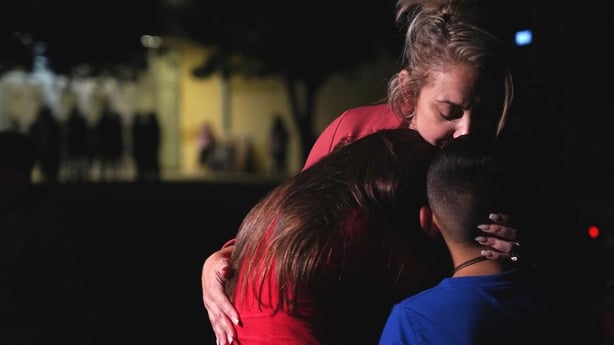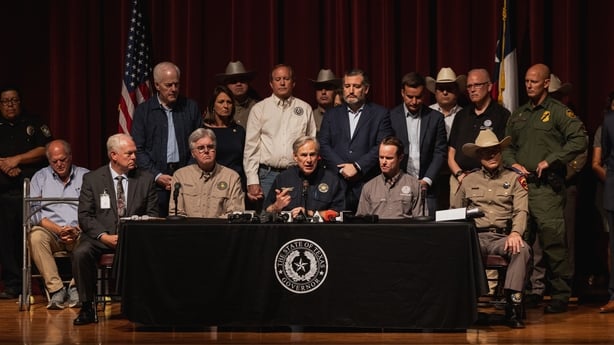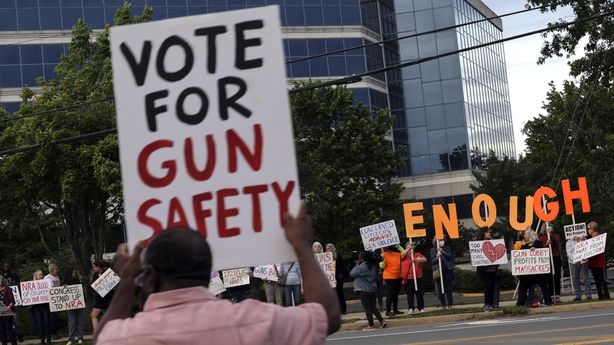For the police, a serious criminal investigation is a difficult thing to pull off at the best of times. When that investigation is freighted with the politics of ideological contest, it becomes that much harder.
Case in point - the law enforcement agencies dealing with the Uvalde school shooting may be labouring under the excess weight of politics, as well as the weight of a hideous mass murder of children in their own community.
Such was the difference between the accounts given in official briefings on Wednesday and Thursday, that suspicions about the role of politics in the investigation has grown.
The initial account of what happened on the morning of 24 May at the Robb Elementary School - delivered from a platform of quasi-uniformed officials, some elected, some actual law enforcement - detailed a confrontation between an armed security guard at the school and the gunman, 18-year-old Salvador Ramos.
Not enough to stop him, but possibly enough to put him off his stride and give time for policemen there to become involved in a shootout with Ramos, before a special tactics officer and other law officers smashed into the classroom Ramos was in and shot him, preventing further carnage.

However, the emergence of videos on social media shows another, altogether more chaotic and drawn-out scene outside the school, where parents shouted and pleaded with officers to intervene, changed the approach of the authorities to communications.
It also changed the approach of the media to the officials, with a lot more challenge to the official version.
The rancorous and rancid nature of the politics of guns in the US - and its particularly virulent Texas variant - have also shaped the communication of this appalling incident.
Read more: Texas gunman barged into school 'unobstructed' - police
For Texas Governor Greg Abbott, it has been primarily about staving off criticism about lax gun laws. His chosen weapon in this struggle is "mental health".
His responses were littered with the term, which was as conspicuous by its presence as the term "gun control" was conspicuous by its absence.
Mr Abbot is a strong believer in "second amendment rights", the constitutional-level protection of the right to bear arms in the US. Last year, he signed into law a package of measures that effectively abolished many of the already weak gun ownership controls in Texas.
Of all the policy initiatives and funding programmes he announced or recapitulated on Tuesday, there was no mention of restricting the rights of teenagers to buy assault rifles and hundreds of rounds of ammunition.
The wider political debate - and its more virulent radio and cable news equivalents - have become rapidly, depressingly, entrenched in antagonism that does not lend itself easily to the political compromise necessary to achieve even a modicum of restrictive change in gun ownership in America.
The old lines have been trotted out - that banning guns won't stop criminals getting their hands on them and that more guns will prevent gun crime - including arming teachers in schools.
Texas already has a budget line for this, but leaves the decisions up to local school boards and teachers whether or not to apply for a school gun grant.

Then there's the "good guy" assertion. The only way to stop a bad guy with a gun is to have a good guy with a gun. So, if you are not going to arm teachers, you need an armed security guard at every school. Again, there is a budget line for such things.
Perhaps that is why the initial account almost needed a school cop to have "engaged" the gunman, to show that the policy was effective.
But it was not effective.
Now they are saying there was no security guard at the school, at least not before the gunman started shooting.
The governor also spoke about the budget lines to "harden" schools against attacks, including things like locked doors. But yesterday, the regional director of the Texas Public Safety Department, Victor Escalon, said the gunman entered the school through a door that may have been unlocked.
Investigators have yet to determine if it was unlocked, or if Ramos had shot out the lock, but US media is rather fixated on this point. Some point out that putting a school on lockdown, as Robb Elementary had been before the shooting incident, means having all the doors locked - not allowing the gunman to enter unhindered.
Read more: Husband of teacher killed in Texas school dies
Another old saying, popular in the 1980s, was "an armed society is a polite society". With 400 million guns and 331 million people, the United States is a well-armed society in aggregate. In reality, gun ownership concentrates many weapons in relatively few hands.
The communications masterstroke of the people who like guns has been to conflate guns with freedom. Not everyone likes guns, but everyone likes freedom.

It's much harder to argue against freedom than it is to argue against allowing 18-year-olds to buy military type assault rifles.
Here in Texas, 18-year-olds can't buy beer in pubs or restaurants, they can't rent cars, but they can buy assault rifles and over $2,000 worth of ammunition.
The clash of ideas around gun ownership laws is expected to play out in Houston, Texas, this weekend.
The National Rifle Association is holding its annual convention this weekend, promising "14 acres of guns, gear and ammo", along with a big country music concert, although some artists, including Don McLean, have pulled out after the Uvalde shooting.
There will also be politics, with a promised appearance by former president Donald Trump.
Mr Abbott was due to attend, but will now address the convention with recorded video remarks and will make a return trip to Uvalde instead.
There will also be protests, notably one organised by a Democratic candidate who wanted to stand against Mr Trump at the last Presidential election, Beto O'Rourke.
It was he who burst into Mr Abbot's news conference on Wednesday and accused him of doing nothing to stop the rise of gun crime in Texas, particularly mass shooting incidents.
It could be a tough weekend for the cops in Houston, as they too will be freighted with the politics of gun control.






